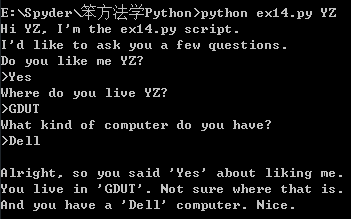习题 13:参数、解包和变量
一个可以接受参数的脚本
from sys import argv
script, first, second, third = argv
print("The script is called:", script)
print("Your first variable is:", first)
print("Your second variable is:", second)
print("Your third variable is:", third)
argv 即所谓的“参数变量”(argument variable),这个变量保存着你运行 Python 脚本时传递给 Python 脚本的参数(所谓脚本,就是你编写的 .py 程序)。在命令行运行 python ex13.py,这条命令中的 ex13.py 部分就是所谓的“参数”。
第 3 行将 argv “解包”(unpack),即把 argv 中的东西解包,将所有的参数依次赋值给左边的这些变量。
习题 14:提示和传递
from sys import argv
script, user_name = argv
prompt = '>'
print("Hi %s, I'm the %s script." % (user_name, script))
print("I'd like to ask you a few questions.")
print("Do you like me %s?" % user_name)
likes = input(prompt) # 显示 > 作为提示符
print("Where do you live %s?" % user_name)
lives = input(prompt)
print("What kind of computer do you have?")
computer = input(prompt)
print("""
Alright, so you said %r about liking me.
You live in %r. Not sure where that is.
And you have a %r computer. Nice.
""" % (likes, lives, computer))

